Onekind Reports
Until October 2010, OneKind was known as Advocates for Animals. Below you will find a selection of reports, some of which were produced before the name change.
Snaring Members Debate May 2017
May 17, 2017
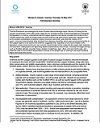
OneKind and the League Against Cruel Sports Scotland (League Scotland) welcome the Scottish Parliament debate on snaring in the name of Colin Smyth MSP. OneKind and the League Scotland, along with many other conservation and wildlife organisations, many veterinary professionals and the majority of the Scottish public, believe that the use of snares to trap wild animals must be banned as they are inhumane, indiscriminate, non-selective and incompatible with conservation.
Read the full briefing here.
A step back in time - The Scottish Government proposal to reintroduce tail-docking
March 28, 2017

In 2016 the Scottish Government proposed reintroducing tail-docking for working dog breeds. OneKind produced this report to help put the animal welfare case to MSPs, press and the public, to ensure that all dogs – above all, young puppies in their very first days of life – are protected from unnecessary pain and long-term behavioural stresses.
A step back in time - The Scottish Government proposal to reintroduce tail-docking
Scotland’s Exotic Pets
January 31, 2017

This report has been produced to support the ongoing review of pet vending legislation in Scotland and contains the results of six months of monitoring of online adverts for exotic animals in Scotland.
The report concludes with recommendations to improve the regulation of the online trade so that the welfare of animals sold online is properly protected.
Cruel & Indiscriminate - Why Scotland must become snare-free
October 10, 2016
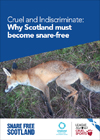
Joint report by OneKind and the League Against Cruel Sports Scotland analysing the use of snares in Scotland and the impact they have on animal welfare. With a foreword by Professor Ranald Munro.
Cruel & Indiscriminate - Why Scotland must become snare-free
Mountain hare briefing
July 25, 2016
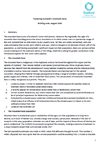
The mountain hare is one of Scotland’s iconic wild animals. Native to the Highlands, the sight of a mountain hare bounding across the snowy mountains in its white winter coat is a spectacular image of the wild Scotland that we and visitors to our country love. Yet they are widely persecuted, with one study estimating that 25,000 were killed in one year.
SnareWatch report
June 29, 2016

Since 2011, OneKind animal protection charity has been appealing for reports about snares found by members of the public from all over the UK through our website SnareWatch.org. This briefing summarises these reports and our key findings from five years of operating this programme.
OneKind Manifesto Scottish Election 2016
February 16, 2016
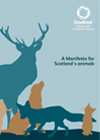
For the 2016 elections to the Scottish Parliament, OneKind animal protection charity is calling on all parties and candidates to prioritise animal welfare in the next session.
We look forward to working together to make Scotland a better place for animals.
OneKind is calling for:
- Review of Scotland’s main animal welfare legislation
- Make welfare in the wild a priority
- Greater protection for farmed animals
OneKind Parliamentary briefing - Hunting with dogs in Scotland
January 19, 2016
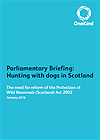
Hunting wild mammals with dogs has been established as seriously compromising the welfare of the hunted animal. This led the Scottish Parliament to pass the Protection of Wild Mammals (Scotland) Act 2002, intended to ban hunting with dogs.
The Act is now in urgent need of review to render it more effective and enforceable. At present it allows too many exemptions and too many loopholes, which can be exploited to allow the chasing and killing of foxes by a full pack of dogs. This is reflected in the fact that the number of mounted fox hunts in Scotland remains the same as it was before the ban in 2002, and there has been no successful prosecution of a mounted fox hunt since the Act was passed.
OneKind Parliamentary briefing - Hunting with dogs in Scotland
OneKind Household Products Report
April 22, 2015

The UK spends millions of pounds every week on household products, with supermarket shelves and kitchen cupboards dominated by products from a small number of multinational giant manufacturers. They come in attractive packaging, they smell nice and they have a job to do.
We may not associate these products with animal welfare problems, because they don't appear to have animal tested or animal derived ingredients. At present, however, animals can still be subjected to painful and distressing experiments so that we can access ever more 'new and improved' products to clean and decorate our houses.
OneKind Manifesto General Election 2015
March 17, 2015

Compassion, respect and protection of animals must be the responsibility of everyone. Parliament can make a huge difference by setting a clear agenda to prioritise the welfare and protection of animals.
The OneKind Manifesto hopes to influence and encourage policy makers towards an agenda which recognises the importance of animal welfare by making recommendations in five key areas.
These include:
- Animals kept as pets and the pet trade
- Welfare of animals in the wild
- Animals used in experiments
- Animals used in food production
- Animals used for entertainment
Pet Origins - the case for reform of UK pet vending legislation
October 30, 2014

This briefing draws on original fieldwork and information published by many organisations with firsthand experience of pet vending issues to describe an industry which has become simply too large and too unregulated, with severe consequences for animal welfare and consumers.
Pet Origins - the case for reform of UK pet vending legislation
Animal Welfare in Scotland - A review of legislation, enforcement and delivery
December 05, 2013

The aim of this document, therefore, is to describe the legislation, delivery mechanisms and resources currently available to protect and promote the welfare of all animals in Scotland – companion animals, farmed animals and free-living wild animals.
Animal Welfare in Scotland - A review of legislation, enforcement and delivery
Farm Assurance Schemes and Animal Welfare
April 04, 2012

Overall, the Soil Association achieved the highest scores for all of the species covered by the analysis. This scheme offers many welfare benefits compared with standard industry practice and the scheme standards would be expected to provide a significantly higher standard of welfare than that provided by adherence to minimum legislative requirements.
Farm Assurance Schemes and Animal Welfare - Executive Summary 2012
April 04, 2012

How the schemes compare. Consumers are increasingly concerned about the welfare of food-producing animals. However, a lack of clear information on the welfare
standards for the animals used in the production of different products is a significant barrier to ethical purchasing and consumer choice (Report produced with support from Compassion in World Farming).
Farm Assurance Schemes and Animal Welfare - Executive Summary 2012
The OneKind Manifesto for Animal Welfare 2011
March 02, 2011
 This OneKind Manifesto sets out some key recommendations for the next Scottish Parliament. Compassion, respect and protection of animals must be the responsibility of everyone. That’s what OneKind is all about. But Parliament can make a significant difference by setting a clear agenda to prioritise the welfare and protection of animals.
This OneKind Manifesto sets out some key recommendations for the next Scottish Parliament. Compassion, respect and protection of animals must be the responsibility of everyone. That’s what OneKind is all about. But Parliament can make a significant difference by setting a clear agenda to prioritise the welfare and protection of animals.
OneKind Manifesto for Animal Welfare
August 17, 2010
This OneKind Manifesto sets out some key recommendations for the next UK government, and the next Parliament. Compassion, respect and protection of animals must be the responsibility of everyone. That’s what OneKind is all about. But Parliament can make a significant difference by setting a clear agenda to prioritise the welfare and protection of animals.
Bobby Roberts’ Super Circus tour of Scotland Summer 2009
April 01, 2010
In the summer of 2009, Bobby Roberts’ Super Circus set out on a tour of southern and central Scotland.Travelling with the circus were horses, ponies and dogs for use in the show, as well as two non-domesticated animals. This report describes how, as the circus went from location to location, it repeatedly ignored local authority leasing and licensing requirements; explains why, in the view of Advocates for Animals, Scottish councils are entitled to have a policy of refusing public entertainment licences to circuses with animals; and calls on the Scottish Government to introduce an outright ban on these outmoded and unnecessary displays, so that public policy can be properly enforced.
A Seal’s Fate: The animal welfare implications of shooting seals in Scotland
April 08, 2009
A Seal’s Fate: The animal welfare implications of shooting seals in Scotland
Protection for seals in Scotland under the Scottish Marine Bill
April 07, 2009
Protection for seals in Scotland under the Scottish Marine Bill
Is culling of grey squirrels a viable tactic to conserve red squirrel populations?
November 05, 2008
Is culling of grey squirrels a viable tactic to conserve red squirrel populations?
Why the tail docking of dogs should be prohibited
July 15, 2008
The Price of a Pedigree - Dog breed standards and breed-related illness
May 20, 2008
The Price of a Pedigree - Dog breed standards and breed-related illness
A Painful Reality - why painful mutilations of animals must be reviewed
September 05, 2006
A Painful Reality - why painful mutilations of animals must be reviewed
Cephalopods and Decapod Crustaceans
September 14, 2005
I donated because..
...because of all the animal-friendly lifestyle tips they promote.
Jenny, Manchester
